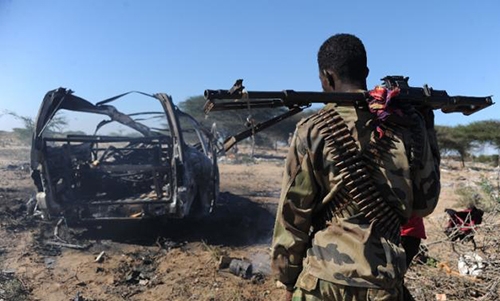Kenya army says it killed Shebab intelligence chief
Kenya's army said Thursday it had killed the intelligence chief of the Shebab Islamist insurgent group and 10 other commanders in an air strike in Somalia.
Kenya celebrated what it called a "major blow" to the Al-Qaeda-linked group with the killing of Mahad Karate, who has a $5 million US bounty on his head.
The Shebab however dismissed the claim as "baseless".
Kenyan troops, part of an African Union force in Somalia (AMISOM) fighting the insurgents, claimed to have killed Karate, a top commander also responsible for internal security, in an air strike at a Shebab training camp 10 days ago.
Karate -- head of the Shebab's Amniyat unit, a special security wing responsible for intelligence, attacks and assassinations -- is said to have been involved in plotting the 2015 massacre of 148 people at Garissa university in northeastern Kenya.
"The killing... is a major blow to the terrorist group," army spokesman David Obonyo said in a statement.
"The Kenya Defence Forces, under AMISOM operations, would like to confirm that Mahad Mohammed Karate... and 10 other middle level commanders were killed in a major KDF strike," in southern Somalia on February 8, Obonyo said.
- 'Key role in attacks' -
The 10-day delay in announcing Karate's death suggests efforts were made to identify the remains.
But the Shehab dismissed the report, saying Kenya was claiming the death after its army base in El-Adde in southwest Somalia was overrun by the Islamists last month.
"All soldiers and leaders of the mujahedeen fighters are safe and sound, there were no air strikes carried out," the group said in a statement.
"The baseless claims made by the Christian government of Kenya is aimed at hiding the massive losses inflicted on them during the attack on El-Adde."
Kenya said that in all more than 50 Shehab were killed in the strike on a Shebab training camp where Karate was present.
Obonyo said the spy chief was presiding over a ceremony for an estimated 80 Amniyat recruits "who had completed their training, and were due for deployment to carry out more terrorist attacks".
He said 42 recruits were also killed and "many others" injured.
Karate was put on the US State Department's wanted terrorist list in April 2015 after the Garissa attack, which followed the 2013 attack in the Kenyan capital when Shebab gunmen slaughtered at least 67 people at Nairobi's Westgate Mall.
"Karate, also known as Abdirahman Mohamed Warsame, played a key role in the Amniyat, the wing of the Shebab responsible for assassinations and the April 2, 2015 attack on Garissa University College," said the US Rewards for Justice wanted notice.
"The Shebab's intelligence wing is involved in the execution of suicide attacks and assassinations in Somalia, Kenya and other countries in the region, and provides logistics and support for Shebab terrorist operations throughout the Horn of Africa," it added.
- One-time number two -
Karate was also the deputy of former Shebab leader Ahmed Godane, killed in a US drone strike in September 2014.
Security sources believe Karate to be a key advocate of switching allegiance from Al-Qaeda to Islamic State, an ongoing and sometimes bloody internal debate within the Shebab.
His death, if confirmed, might strengthen leader Ahmed Diriye's efforts to remain loyal to Al-Qaeda.
Kenya has accused Karate of plotting the El-Adde assault.
"It is believed that Karate played a major role in the recent attack on KDF troops in El-Adde by the deployment of his suicide bombers," Obonyo said, adding that operations against the Shebab "will continue until justice is done".
The Shebab is fighting to overthrow the internationally-backed government in Mogadishu, which is protected by 22,000 African Union troops.
Kenyan officials have given no death toll from the storming of its base, but many suspect it to have been the country's worst military disaster, with the Shebab claiming to have killed more than 100 Kenyan soldiers.
At the time, President Uhuru Kenyatta vowed revenge saying the Shebab would "have no time to breathe".
Last week, the Shebab claimed responsibility for a bomb attack which ripped a hole in a passenger plane shortly after takeoff from the capital Mogadishu earlier this month.
Photo: A Somali soldier inspects the site of a 2014 suicide bomb attack by Shebab insurgents in Mogadishu. (Yahoo)
Related Posts

